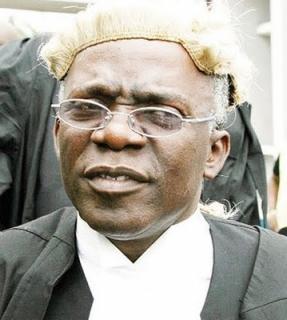
Following the granting of a stay of proceedings by the Supreme Court in the cases of FRN v Dr. Bukola Saraki some Senior Advocates of Nigerian lavishly commended the wisdom which informed the decision. A few days later, I had cause to x-ray and criticize the ruling given the abolition of stay and interlocutory appeals in all criminal trials in the federal courts by the combined effect of sections 306 and 396 of the Administration of Criminal Justice Act, 2015 (ACJA). Not a few other lawyers have risen to the defense of the apex court.

In contributing to the debate, Mr. J. B. Daudu SAN, the lead Counsel to Dr. Saraki was reported to have threatened to initiate contempt proceedings against some "disgruntled persons" in a bid to protect the image of the judiciary. As far as the learned senior advocate is concerned, it is illegal to criticize any decision of the Supreme Court. This is interesting in view of the fact that it was Mr. Daudu who started the debate on the ruling. It is on record that as soon as he came out of the court after the delivery of the ruling in the case Mr. Daudu addressed the press and stated that the defense had been vindicated by the pronouncement of the apex court on the issue of stay of proceedings. Certainly, the commendation of Supreme Court by the senior counsel for ruling in favor of his client is not contemptuous!
Without engaging in unnecessary debates over the issue of stay of proceedings, it is pertinent to point out that the right to criticize the judgments of courts is part of the fundamental right of every citizen to freedom of expression guaranteed by section 39 of the Constitution. What is not permitted is to scandalize a court or accuse judges of impropriety or misconduct without any proof. In this regard, I can say, without any fear of contradiction, that Mr. Daudu has, more than any other lawyer in Nigeria, consistently lampooned sitting and retired judges for engaging in massive judicial corruption without supplying any scintilla of evidence to substantiate his claim.
However, the Supreme Court has always appreciated constructive criticism of its decisions having regards to their finality and overall impact on the nation's legal system. In Adegoke Motors v Adesanya (1989) 3 N.W.L.R. (Pt 109) 250 at 274-275, the revered Chukwudifu Oputa J.S.C alluded to the finality of the decisions of the Supreme Court when he said that "we are final not because we are infallible, rather we are infallible because we are final. Justices of this Court are human beings capable of erring. It will be shortsighted arrogance not to accept this obvious truth. It is also true that this court can do inestimable good through its wise decisions. Similarly, the Court can do incalculable harm through its mistakes."
In the same vein, the late Justice Kayode Eso said in the case of Adigun v Governor of Oyo State (No 2) 2 N.W.R (Pt 56) 197 at 214-215 that "the decision of the Supreme Court is final. Final in the sense of real finality in so far as the particular case before it is concerned. It is final forever, except there is legislation to the contrary, and it has to be a legislation ad hominem". In recognition of the enormous powers of the apex court, Justice Eso was of the view that "It is such dread powers that must necessitate great care in the calibre of the Court and such dread that must necessitate pungent and constructive analytical criticism of every judgment of the Court in the law journals and similar fora". In reaction to the view of some judges and lawyers that it is contemptuous to subject decisions of courts to criticism, Justice Eso stated that "the judgment of a court should not be treated with sacred sanctity, once it gets to the right critical forum".
While conceding that the ACJA has effectively abolished stay of proceedings in trial courts, Messrs Olisa Agbakoba SAN and Mike Ozekhome SAN have argued that the law is not applicable in the appellate courts! The argument of both learned senior counsel has failed to take cognizance of the trite law that appellate courts have no original jurisdiction in applications for stay of proceedings. Hence, litigants applying for a stay of proceedings are mandatorily required by the appellate courts to attach the ruling of the lower court which dismissed or struck out a similar application. In any case, there shall be no interlocutory appeals which may warrant the filing of stay of proceedings since the ACJA has consolidated all preliminary objections with the substantive case.
With respect, the contributions of some senior counsel to the debate smack of hypocrisy. For instance, both Messrs Agbakoba and Ozekhome and I were members of the Committee on Law, Judiciary, Human Rights and Legal Reforms of the 2014 National Conference. The committee headed by the Honorable Justice George Oguntade (rtd) had recommended, among other things, the establishment of a special anti-corruption court, devoid of niceties and technicalities of the conventional courts such as preliminary objections and interlocutors appeals. The recommendations and several others on judicial reforms were unanimously adopted by all conference delegates. Although, an anti-corruption court has not been created the recommendations of the National Conference on the abolition of stay of proceedings and interlocutory appeals in criminal proceedings have emerged as sections 306 and 396 of the ACJA. All the lawyers who had campaigned for the abolition of interlocutory appeals are morally estopped from questioning the legal validity of the relevant provisions of the ACJA.
Those colleagues who think, rather erroneously, that they are defending the Supreme Court ought to be reminded of the state of the law on the stay of proceedings before the enactment of the ACJA. Following the embarrassment caused by the conviction of James Ibori in a British Court after he had been freed by the federal high on the basis of the preliminary objection raised by the defense team led by Mr. James Daudu SAN the federal government expressed concern over the manipulation of the legal system by politically exposed persons. In response to the serious complaint the heads of the Supreme Court, Court of Appeal and Federal High Court issued Practice Directions to fast track the trial and appeals arising from cases of corruption, money laundering, human trafficking, kidnapping, rape and terrorism.
Thus, pursuant to Order 1 of the Federal High Court (Criminal) Practice Directions, 2013 the rules shall minimize undue adjournments and delays and reduce the time spent at trials dealing with interlocutory matters and ensure that hearings are not stalled by unpreparedness of Court or the parties. Order 6 thereof stipulates that the hearing of cases prosecuted by the EFCC, ICPC and SSS shall be conducted on a day to day basis as far as the schedule of the Court may permit. Without ensuring that investigation has been concluded and a prima facie case established a prosecutor shall not file against a defendant in the court.
In order to discourage interlocutory appeals, Order 7 of the Court of Appeal Practice Directions 2013, provides that "the courts shall refuse to hear appeals arising from interlocutory decisions of the court below where the matter deals with any of the issues in 3 above and the court is of the opinion that the grounds raised in the appeal are such that can conveniently be determined by way of an appeal arising from the final judgment of the court below." Instead of entertaining interlocutory appeals the Court of Appeal may order the trial court "to accelerate hearing in the substantive suit."
Order 10 of the Supreme Court (Criminal Appeals) Practice Directions, 2013 is in pari materia with Order 7 of the Court of Appeal Practice Directions, 2013. It is however provided that the apex court " will only determine applications which cannot be taken with the substantive appeal." For the avoidance of doubt, each Panel of the Supreme Court shall take all steps "to reduce the time spent on hearing and determination of interlocutory applications both at the trial court and appeal and in the process minimize avenues for parties to make use of interlocutory applications as a means to frustrate or delay the expeditious conduct of cases at the Courts below."
Furthermore, the President of the Court of Appeal issued the Court of Appeal (Fast Track) Practice Directions 2014 on December 8, 2014. Order 4 of the Practice Directions specifically states that that active case management includes "discouraging interlocutory appeals and requiring parties, except in the most deserving cases, to subsume their interlocutory matters under a final appeal or under the substantive suit at the trial court," In dealing swiftly with applications and objections to minimize their interruption of the main proceedings the Court will penalize delay tactics with heavy costs and rely on technology to aid case management. Court processes may be served by electronic means.
It is abundantly clear from the foregoing, that the Federal High Court and both appellate courts in the country had, before the enactment of ACJA, adopted measures to discourage parties and their counsel from resorting to interlocutory appeals to frustrate the hearing and determination of cases of economic crimes and terrorism. To that extent, it is of no moment to insist that the abolition of stay of proceedings and interlocutory appeals by the ACJA is illegal and unconstitutional. Therefore, the contempt proceedings being initiated by Mr. Daudu will certainly provide an opportunity for me to join issues with the lawyers who are manipulating the criminal justice system to shield members of the ruling class from prosecution for grand corruption while indigent suspects are railroaded to jail over minor economic offenses.
Femi Falana SAN.